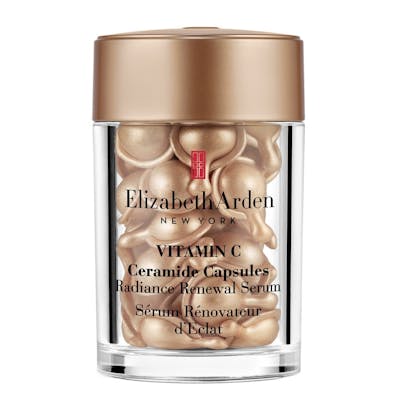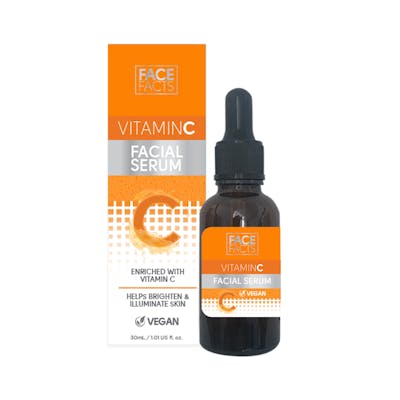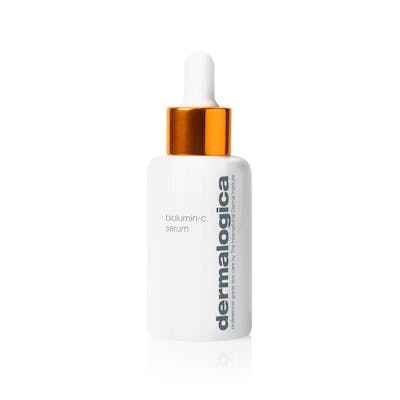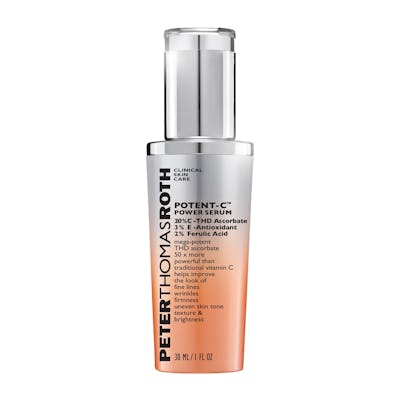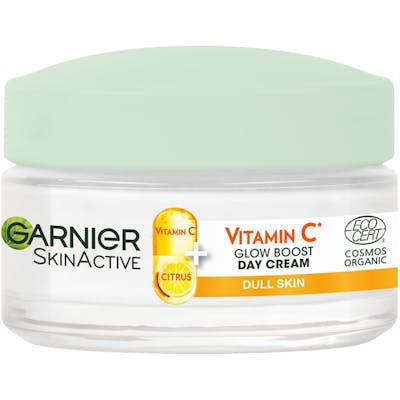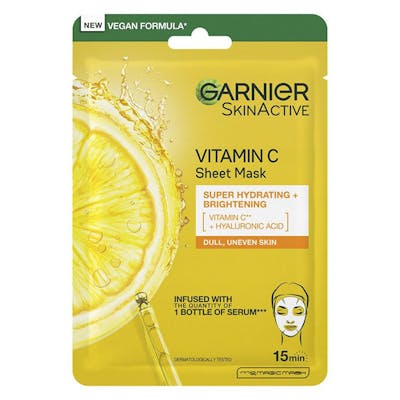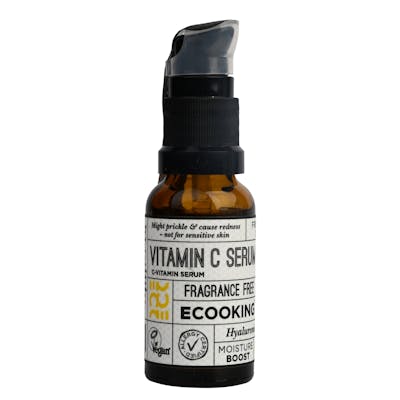
Everything you need to know about vitamin C
Along with retinol and niacinamide, vitamin C is one of the most popular and well-documented ingredients in skin care. You have probably already come across vitamin C, either as a dietary supplement or in skin care products. But have you ever thought about what vitamin C does for your body and what it does for your skin if you use it in your skin care? Keep reading to learn more about vitamin C.
Benefits
What is Vitamin C?
Vitamin C is a water-soluble vitamin that is essential for human health. It is a powerful antioxidant that helps protect the body from damage caused by free radicals, which can prevent chronic diseases such as cancer, heart disease and diabetes.
Vitamin C also plays a crucial role in the production of collagen, which is a protein important for healthy skin, bones and connective tissue. In addition, vitamin C supports the immune system and helps the body absorb iron from plant-based foods. While the body cannot produce vitamin C on its own, it can be obtained from a variety of supplements and foods such as citrus fruits, berries, kiwi, broccoli, tomatoes and peppers.
Due to the many great benefits, vitamin C has gained a lot of traction in the beauty industry, and vitamin C serums and vitamin C creams are products most people incorporate into their skin care routines.
Types of Vitamin C
If you are looking for vitamin C on the ingredient list of your face cream, you will look in vain. But, if you look for L-Ascorbic Acid or Accorbyl Palmitate, you will find your vitamin C. However, it must be mentioned that vitamin C comes in many forms and can appear on the ingredients list in many ways. Below you can read more about some of the types of vitamin C available.
Ascorbic acid: Among all forms of vitamin C, Ascorbic acid - also known as L-ascorbic acid is on the ingredient list. This ingredient is the most studied for its beneficial effects on the skin. This is why you will most often come across it in well-formulated skin care products. Ascorbic acid in high concentrations (15% or higher) is perfect for treating the most persistent skin problems. In addition to ascorbic acid, sodium ascorbic phosphate, ascorbic palmitate, retinyl ascorbate, tetrahexyldecyl ascorbate and magnesium ascorbic phosphate are the most stable and effective forms used in skincare.
How does vitamin C work?
It almost sounds too good to be true, but vitamin C really is a multitasker that you'll want to have in your skincare repertoire. The powerful antioxidant can offer numerous benefits to the skin when used in creams, oils or serums.
Vitamin C can reduce the appearance of hyperpigmentation and age spots, resulting in a brighter and more even complexion. Vitamin C neutralizes free radicals and protects the skin from damage. In addition, vitamin C can help exfoliate the skin, leaving it smoother and softer.
Vitamin C also has anti-inflammatory properties that can help soothe irritated or inflamed skin. Last but not least, vitamin C increases cell renewal and stimulates the formation of collagen, which can help reduce the appearance of lines and wrinkles.
Vitamin C in food supplements
To speed up your treatments for sun damage, deep lines and unevenness etc. you can take advantage of vitamin C's powerful effect in the form of vitamin C supplements. As a dietary supplement, vitamin C contributes to the normal functioning of the immune system, and at the same time has great importance for wound healing. Furthermore, vitamin C helps to reduce fatigue and exhaustion and increases the body's ability to absorb iron. Therefore, it makes good sense to incorporate vitamin C into your dietary supplement. You can find various dietary supplements with vitamin C in the selection here.
How much vitamin C should you have?
The question of how much vitamin C you should have per day is generally very widespread, and the NHS does not issue any general recommendations for the intake of vitamins and minerals.
Lack of vitamin C manifests itself in the form of:
- Fatigue
- Exhaustion
- Bleeding in the skin
- Poor wound healing
- Application
To reap the most benefits from using vitamin C for the skin, you should apply the supervitamin to clean, dry skin. Use your vitamin C serum or vitamin C cream morning and night. Apply your vitamin C product as a base layer before applying other skin care products. Be aware that vitamin C makes your skin sensitive to the sun. It can therefore be an advantage to use vitamin C in the evening, so that it can work at night without your skin being disturbed by the sun.
Vitamin C is a multitasker and a real team player. It's good on its own, but combined with other beneficial ingredients, vitamin C is brilliant! Make your vitamin C serum or vitamin C cream perform even better by combining the ingredient with other strong antioxidants in your skin care routine, such as Vitamin E. Vitamin C for the skin works more effectively when combined with other antioxidants, as they work together to protect the skin from the external environment and keep the skin healthy and bright. So yes, no good skin care without vitamin C!
How long does it take to see results?
3 weeks.
Good to know
Although vitamin C is one of the truly effective ingredients, unfortunately vitamin C is also very fragile and its effect will gradually decrease as soon as it is exposed to air, heat and sunlight. This is due to the chemical composition of the product starting to change, and unfortunately you cannot count on the vitamin C cream, oil or vitamin C serum to keep having the same effect as on first use. Fortunately, the dark and cold environment of the refrigerator can help preserve the effectiveness of your products.
Use of vitamin C in skin care
Vitamin C in skin care is safe for all skin types. However, it is recommended to start with a product with a low concentration of vitamin C just to see how your skin reacts. If you have sensitive skin, you should start with a low concentration vitamin C cream or Vitamin C serum for the face. This will minimize irritation as your skin adjusts. Then you can gradually work your way up to higher concentrations and enjoy the amazing vitamin C benefits for the skin.
Vitamin C cream
Regardless of your age and gender, vitamin C should be part of your skin care routine. After all, it is - as previously mentioned - an absolutely indispensable ingredient in skin care. Vitamin C creams are, so to speak, the product that ensures that your skin's barrier function works during the day. If you find that your skin looks dull and gray, then vitamin C can really be a lifesaver. Glow - that's exactly what the skin gets when you use vitamin C in your skin care routine. And in fact, vitamin C can do much more than make the skin glow. Vitamin C in skin care contributes to a more uniform skin tone. You will also find anti-aging products with vitamin C, such as vitamin C face creams and vitamin C serums.
Vitamin C serum
Serum is really good at keeping the moisture and problem-solving directly on the skin. Serums often also have a higher concentration of "active" ingredients than creams, but this varies greatly from brand to brand. Vitamin C serum is particularly good if you have started to get visible wrinkles and fine lines. With vitamin C serum, you get healthier and fresher-looking skin with more glow and color. Vitamin C serum works on both visible and invisible skin damage - such as fine lines, impurities and deep-seated sun damage.
 Save on everything
Save on everything


